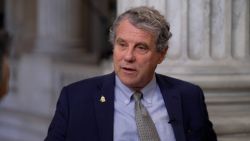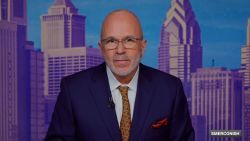Republican Sen. Marco Rubio and Democratic Rep. Val Demings demonstrated in Tuesday’s Florida Senate debate why they are considered two of the brightest stars by their respective parties.
In a spirited and testy 60-minute debate – the first and only of the race – they traded quick barbs, sharp rebukes and pointed answers, covering a range of issues from abortion and guns to the economy and nuclear war.
Rubio, a one-time presidential candidate who is no stranger to the debate stage, leaned into his legislative achievements and policy proposals while calling his opponent a creature of the political left who hasn’t passed any meaningful bills. Demings, a House impeachment manager during former President Donald Trump’s first impeachment proceedings, painted Rubio as a politician who will say and do anything to get reelected and compared his long career in elected office to her time on the police force in Orlando.
The race has largely flown under the radar compared to other hotly contested matchups that could control the fate of the evenly divided Senate. And neither party had plans going into Tuesday to spend much on airtime in the final three weeks. That reality favors Rubio in a state where Republicans have consistently held the electoral edge and now outnumber Democrats in registered voters, putting the onus on Demings Tuesday to seize momentum before early voting begins on Monday in many counties.
Here are five takeaways from the debate.
Abortion access looms large
On a day when President Joe Biden moved to recast the midterm election as a referendum on abortion access, Demings and Rubio tried to pin each other down on where they would draw the line in a post-Roe world.
Rubio said that he is “100% pro-life,” including in cases of rape or incest because “I don’t believe that the value of human life is determined by the circumstances.” But he said he would support legislation with exceptions if it helps get something passed. He is one of nine Republican co-sponsors of a Senate bill to ban abortion nationwide at 15 weeks, which Sen. Lindsey Graham filed in response to the US Supreme Court decision in Dobbs earlier this year.
More on recent debates
“We’re never going to get a vote on a law that doesn’t have exceptions, because that’s where the majority of the American people are,” Rubio said. “And I respect and understand that.”
Demings in her response invoked her law enforcement background (she is a former Orlando police officer and chief of police) for the first of several times.
“As a police detective who investigated cases of rape and incest, no, Senator, I don’t think it’s okay for a 10-year-old girl to be raped and have to carry the seed of her rapist,” Demings said.
Pushed by Rubio to define the week she would limit abortion, Demings said she would “support a woman’s right to choose up to the time of viability,” and would let doctors decide when that is. Rubio said that wasn’t good enough.
“She supports no limits of any kind,” he said. “That is out of the mainstream. That is radical.”

Firearms a focus
In a country perpetually rocked by gun violence, Florida still manages to stand out as a state uniquely affected by mass shootings. Rubio served in the Senate for two of the most notable, which stand as key moments in his political biography. Rubio said he decided to run for reelection to the Senate after the 2016 Pulse nightclub massacre. After the 2018 tragedy at a Parkland high school, Rubio faced a crowd at a CNN Town Hall that demanded action and he promised he would work on solutions.
In that town hall event, Rubio said, “I absolutely believe that in this country, if you are 18 years of age, you should not be able to buy a rifle, and I will support a law that takes that right away,” adding, “I think that’s the right thing to do.”
Asked on Tuesday about his vow at that forum to consider age restrictions for certain firearms, Rubio said, “That doesn’t work.”
“I think the solution of this problem is to identify these people that are acting this way and stop them before they act,” Rubio said, pointing to the so-called red flag bill he proposed that would give states tools to implement a process to take guns out of the hands of people flagged as threats by law enforcement. But Rubio voted against a bipartisan gun safety bill that Biden signed into law.
“The fundamental issue is why are these kids, why are these people going out there and massacring these people?” Rubio said. “Because a lot of people own AR-15s and they don’t kill anyone.”
To which Demings responded: “People who are families of victims of gun violence just heard that and they’re asking themselves, ‘What in the hell did he just say?’”
Demings, whose Orlando-based district includes Pulse, said Rubio has done “nothing to help address gun violence and get dangerous weapons out of the hands of dangerous people.”
Rubio replied that it’s impossible to legislate criminals.
“The only people that follow these laws are law-abiding citizens,” he said.
Demings responded: “Why don’t we just stop arresting murderers since we can’t find them all?”

Hurricane politics
Out of the gate, Rubio and Demings were asked about Hurricane Ian, the massive Category 4 hurricane that pummeled Florida’s Southwest coast last month, and what the country should do to prepare for future super storms.
Demings wasted no time mentioning climate change.
More on key Senate races
“If we don’t do something about it, we’re going to pay a terrible price for it,” Demings said. “The federal government has got to make sure that FEMA has the resources that it needs to adequately respond, but we gotta get serious about climate change.”
Rubio declined to look ahead, or discuss climate change, and instead focused on emergency response and recovery.
Asked later about the crumbling property insurance in the state, a focal point in the wake of Ian, Rubio called it “a state issue.”
Demings shot back that if it is a state issue then Rubio had a chance to address the problem when he was speaker of the Florida House.
“He’s been in elected office since 1998 and insurance of Florida has tripled and people are suffering,” Demings said. “I sent a letter to Governor (Ron) DeSantis saying, ‘Yes, I know it’s a state issue. But how can we work together to lower the costs of property insurance for Floridians because people are suffering?’”
Rubio said he did address it in the Florida House.
“You know who the governor was at the time? Charlie Crist, your gubernatorial candidate,” Rubio quipped. “I think you’ve endorsed him. So you should ask him if it didn’t work, but we certainly supported it.”
Avoiding Trump
While Trump has loomed large in many of the midterm contests this cycle, he was hardly mentioned in a debate in a race that will determine who will represent the former President in Washington.
Demings, in fact, never mentioned Trump at all.
Nor did DeSantis, the state’s consequential Republican governor, get much airtime.
But the other top Republican in the state – Sen. Rick Scott, the head of the Senate GOP campaign arm – was the topic of discussion on Social Security and Medicare.
Rubio was asked about Scott’s 11-point “Rescue America” plan, which included a provision to sunset all federal programs every five years, including the popular entitlement programs.
Rubio quickly dismissed the idea. “That’s not my plan.”
“You should ask him,” Rubio said.
Back and forth on the border
A segment focused on immigration policy started with the moderator asking Rubio about Biden’s new policy to stem the flow of Venezuelan migrants by having them apply to arrive in the US at ports of entry, not the Mexico-US border.
Rubio summarized it thusly: “Joe Biden just instituted Trump’s ‘Return to Mexico’ policy.”
“This cannot continue. It has to be fixed,” he added. “That needs to happen with everyone that’s trying to come across but we’re gonna have 10,000 people a day coming. And we can’t afford it. No country in the world can tolerate that.”
The Republican then put Demings on the defensive over the number of people who have crossed into the United States since Biden took office while also attempting to appear sympathetic to the people fleeing brutal regimes in South America. Florida is home to many Latino communities, including the largest population of Venezuelans living in the US.
“No one has done more on the issue of Venezuela than I have,” Rubio said. “And Cuba and Nicaragua.”
Demings, too, attempted to straddle her party’s support for migrants seeking asylum without appearing indifferent to the concerns about the activity at the Southern border. She said she supported adding border patrol agents, investing in unspecified technology and hiring more people to process migrants moving through the legal immigration system.
“We’re a nation of laws,” Demings said. “We have to enforce the law but we also obey the law that says people who were in trouble can seek asylum in this country.”





















